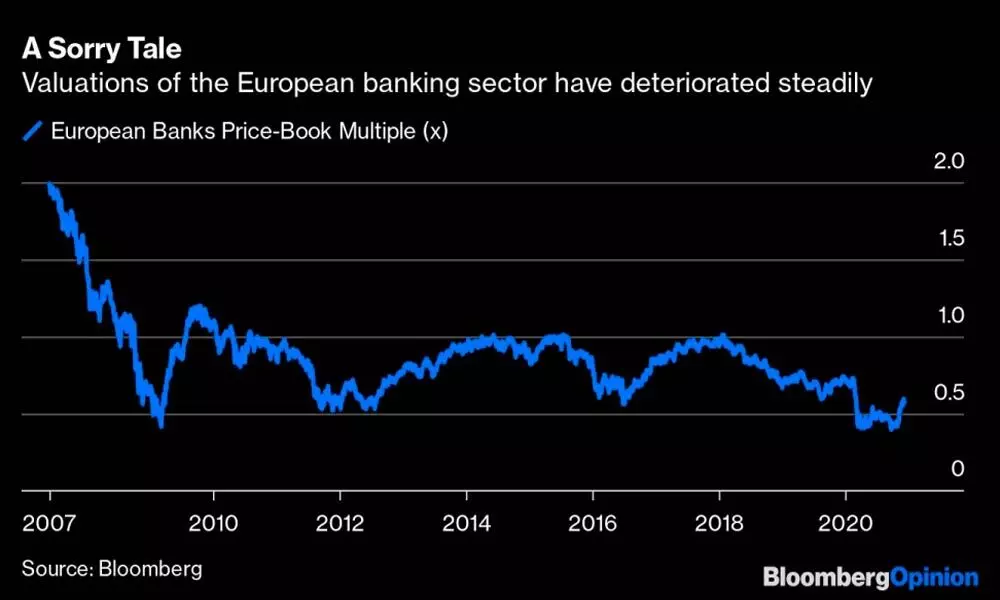Why some investment bankers deserve a bonus?
Not all banks are equal, nor should they be treated as such. Several large European lenders, such as Spain’s BBVA SA, Italy’s Intesa Sanpaolo SpA and ING Groep NV of the Netherlands are sitting on piles of cash, which ought to be at least partially returned to shareholders
image for illustrative purpose

ECB should resist the urge to cancel ability of banks to compensate
The European Central Bank is due to update its guidance for next year on how banks handle their capital buffers. There has been an effective ban on dividends and stock buybacks since July and extreme moderation urged on banker pay. While the ECB review might lift the cap on shareholder payouts partially, banker compensation is trickier.
A slew of fiscal and monetary policy responses to the pandemic, including a big increase in central bank bond buying, has propelled the market rally that boosted European banks' fixed-income and equity trading in 2020.
So you can see why policy makers are wary of a political backlash over unjustified rewards. A summer missive from the ECB to euro-zone bank bosses was clear: The reputational impact of variable-remuneration payments in a global crisis "should not be underestimated."
Nonetheless, the ECB should resist the urge to quash entirely the ability of banks to compensate - and thereby retain - their top performers.
That's for one simple reason: Wall Street investment banks.
Even Christine Lagarde's institution has acknowledged that US behemoths such as JPMorgan Chase & Co. are taking market share in Europe and this cannot be conveniently ignored. It would be self-defeating to let them snap up more talented European bankers by offering more money.
One workaround solution lies in letting Europe's banks offer their stars deferred pay and a package of stock rewards rather than straight cash. Bankers can always console themselves that at least any awarded equity would be cheap, with most banks trading at a 40 per cent - 60 per cent discount to book value
Fixed-income trading has enjoyed a bumper year everywhere, with third-quarter revenues in this business up more than 25 per cent year on year and almost breaching decade highs, according to Coalition data. And yet, Europe's banks are falling behind on how much of this business they do. Across trading and investment banking, US banks have taken another 3 percentage points of market share globally this year.
Wall Street's finest are also increasing fixed-income headcount. European banks, by contrast, have cut markets-related staff by 5 per cent and that won't mark the end of the bloodletting.
The UK's Prudential Regulation Authority says it will let some banks restart dividend payments having completed two sets of stress tests, a sensible measure that the ECB has decided to delay. However, the PRA didn't ease its advice for a high degree of caution on cash bonuses, and it will scrutinize payouts. The ECB will most likely follow the same path on shareholder payouts and bonuses.
To shore up the banks as coronavirus took hold, Europe shifted its focus to capital retention and relaxed its regulatory scrutiny to keep the lending taps open.
As this unwinds and the vaccine heralds an eventual resumption of normal business, regulators will probably return to the strictest definitions of capital and liquidity. Any return to dividends and buybacks will have to be supported by a rock-solid balance sheet.
They'll also need to be underpinned by credible assumptions and an improving return-on-capital trajectory.
Not all banks are equal, nor should they be treated as such. Several large European lenders, such as Spain's BBVA SA, Italy's Intesa Sanpaolo SpA and ING Groep NV of the Netherlands are sitting on piles of cash, which ought to be at least partially returned to shareholders.
On dividends, it appears likely that the ECB will trust national regulators to use discretion and filter domestic banks' appropriately. There's no reason why it couldn't do similar on bonuses, as long as they're packaged appropriately. If Europe's strongest banks are held back from retaining key performers or rewarding shareholders by overly zealous regulators, US banks will continue to take advantage.
Europe's bank bosses will hope for cautious optimism from the ECB, and a sensible framework to begin capital return. A tacit acknowledgment might not go amiss that - unlike the dark days of 2008 - they weren't to blame this time. They've actually helped. (Bloomberg)

